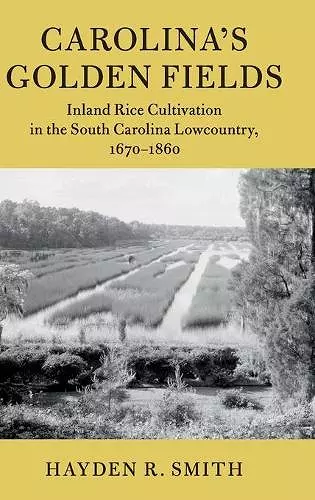Carolina's Golden Fields
Inland Rice Cultivation in the South Carolina Lowcountry, 1670–1860
Format:Hardback
Publisher:Cambridge University Press
Published:31st Oct '19
Currently unavailable, and unfortunately no date known when it will be back

Examines the environmental and technological complexity of South Carolina inland rice plantations from 1670 to 1860.
This book examines the environmental and technological complexity of South Carolina inland rice plantations from their inception at the turn of the seventeenth century to the brink of their institutional collapse at the eve of the Civil War.This book examines the environmental and technological complexity of South Carolina inland rice plantations from their inception at the turn of the seventeenth century to the brink of their institutional collapse at the eve of the Civil War. Inland rice cultivation provided a foundation for the South Carolina colonial plantation complex and enabled planters' participation in the Atlantic economy, dependence on enslaved labor, and dramatic alteration of the natural landscape. Moreover, the growing population of enslaved Africans led to a diversely-acculturated landscape unique to the Southeastern Coastal Plain. Despite this significance, Lowcountry inland rice cultivation has had an elusive history. Unlike many historical interpretations that categorize inland rice cultivation in a universal and simplistic manner, this study explains how agricultural systems varied among plantations. By focusing on planters' and slaves' alteration of the inland topography, this book emphasizes how agricultural methods met the demands of the local environment.
'Carolina's Golden Fields recovers from obscurity a history of inland rice cultivation that has hitherto been depicted by historians merely as a primitive and early stage in the long history of rice agriculture in South Carolina. It decisively shows instead that planters grew inland rice continuously as part of a complex of crop choices, and grew it in ways that ingeniously made the most of local environments. This study also demonstrates just how much can be recovered and learned when the analytical tools of environmental history are applied to the history of agriculture.' Mart Stewart, Western Washington University
'To cultivate South Carolina's great staple crop, colonists and slaves moved earth and water, reshaping the landscapes of the coastal Lowcountry. Smith reconstructs this world of adaptation with persuasive case studies. For more than 150 years, planters forced slaves to remake the freshwater swamps to keep them productive. This book demonstrates that early Carolina was no sleepy backwater, but rather a dynamic place linked to a larger Atlantic economy that rewarded technological innovation. Full of new insights derived from environmental science, Carolina's Golden Fields offers a rigorous new picture of plantation agriculture.' S. Max Edelson, University of Virginia
'Smith's research is impressive. He draws on a rich selection of primary source material, including deep dives into the records of individual rice plantations. The book also demonstrates his broad reading of the secondary literature, not just on rice but also of the work dealing with plantations, slavery, and the southern environment. It is a nuanced and thoughtful study, restoring inland rice to a central place in the impressive body of literature on the southern staple, and a valuable addition to the region's agricultural history.' Drew Swanson, Environmental History
'… it is an admirable model for how 'attention to the environment leads to … historical analysis' … Smith expertly leads the reader to a better understanding of how early Americans perceived and exploited the natural world.' Philip Mills Herrington, Journal of Southern History
'Smith's work deserves to be read by specialists in environmental history and South Carolina rice cultivation and will also bring value to advanced undergraduates, graduate students, and museum professionals, public historians, and preservationists with historic landscapes in their care. By joining the frameworks and methodologies of environmental history, archaeology, histories of slavery, technology, and agriculture, and material culture studies, Smith tells a rich story about land, labor, and change over time in the South Carolina Lowcountry.' Bethany J. McGlyn, H-Environment
'Hayden Smith has walked the land he describes, and Carolina's Golden Fields exemplifies his intimate knowledge of the Lowcountry, past and present, as well as his skill as a historian. His astute attention to the terrain of forest and history make this a readable, informed, and important contribution to the historiography of rice, slavery, and the environment.' T. Robert Hart, Agricultural History
ISBN: 9781108423403
Dimensions: 235mm x 157mm x 19mm
Weight: 500g
258 pages